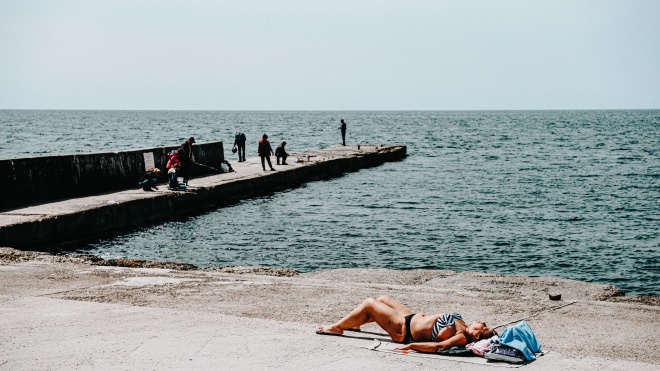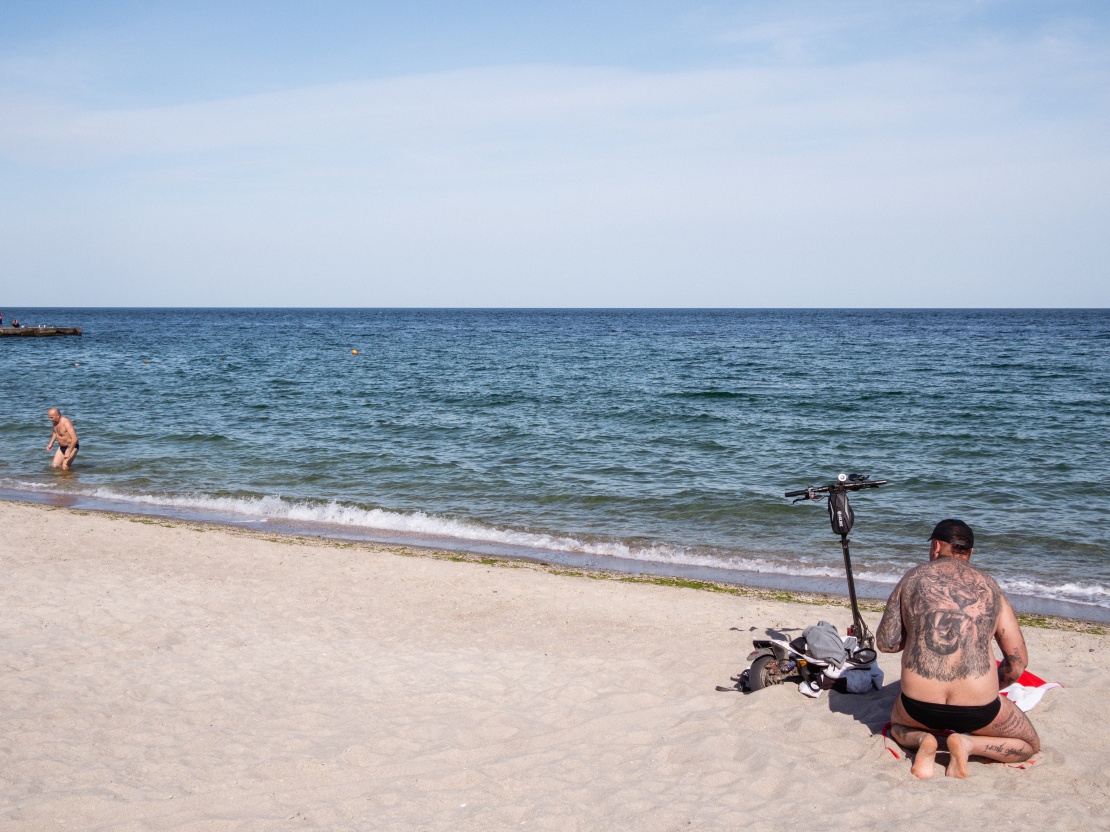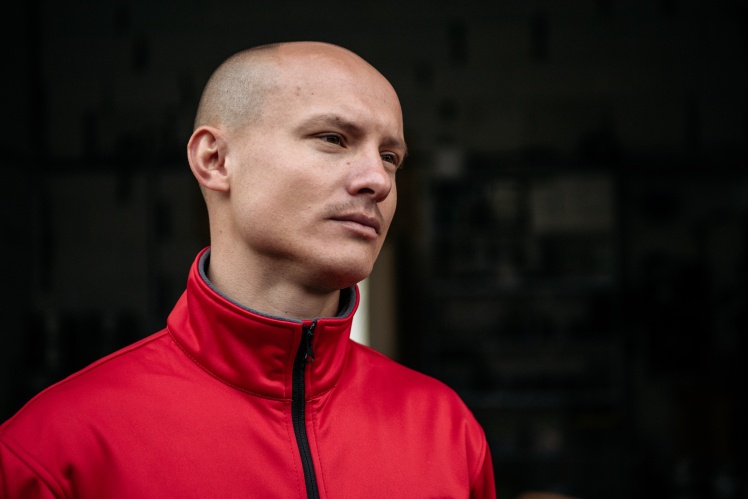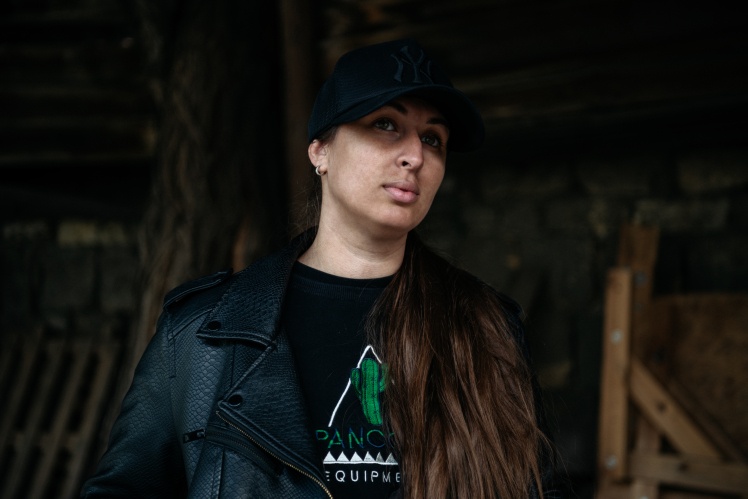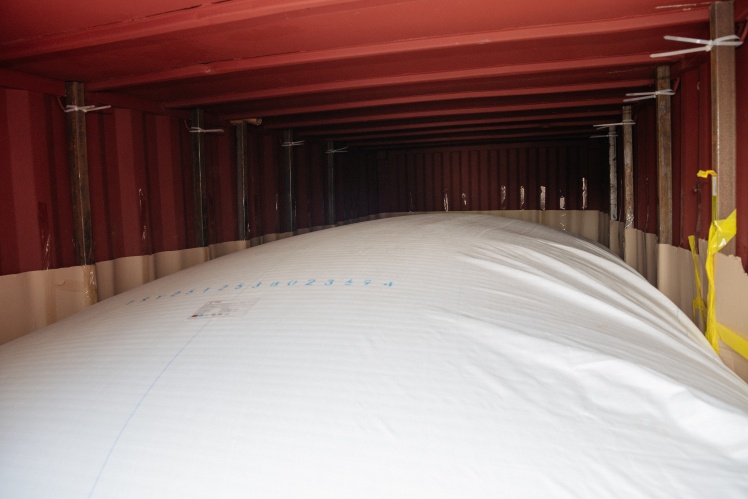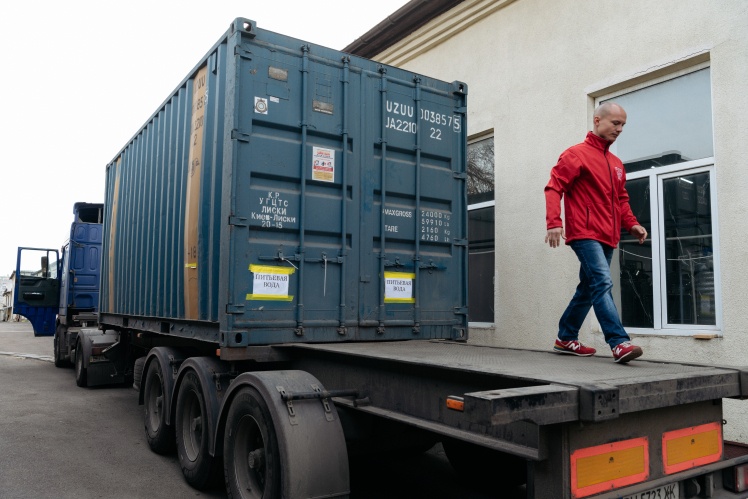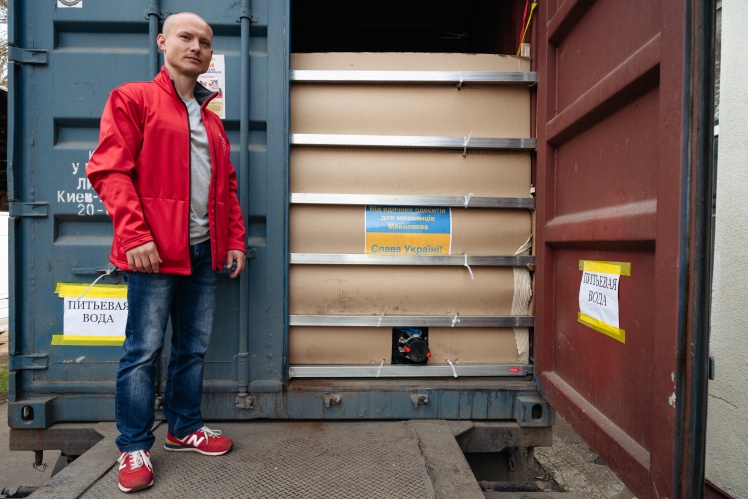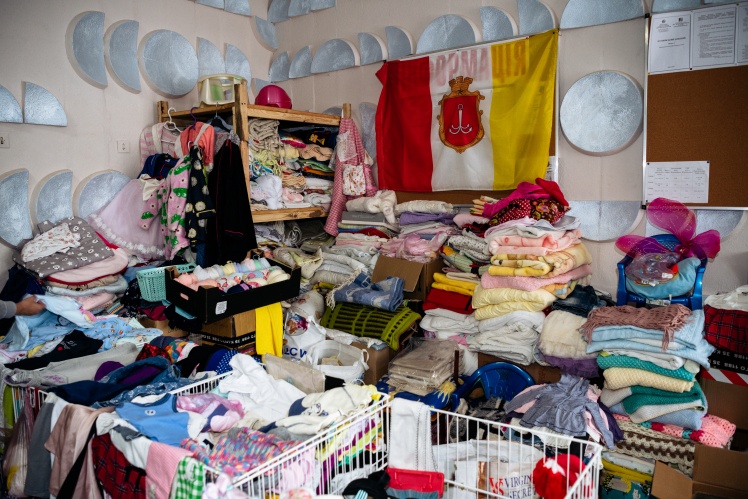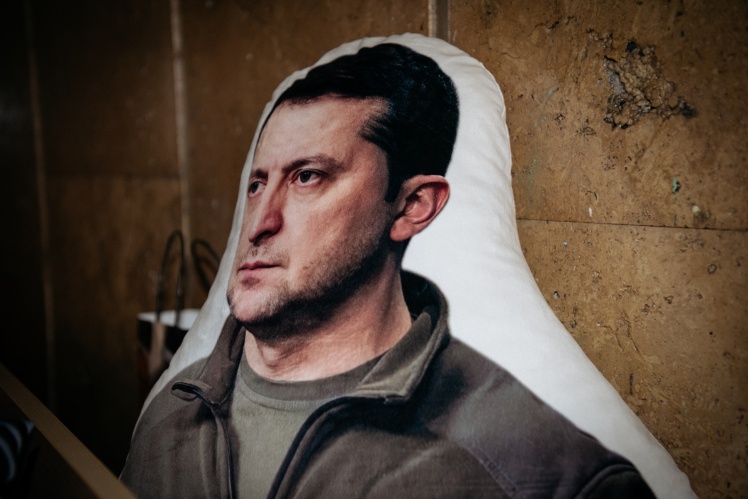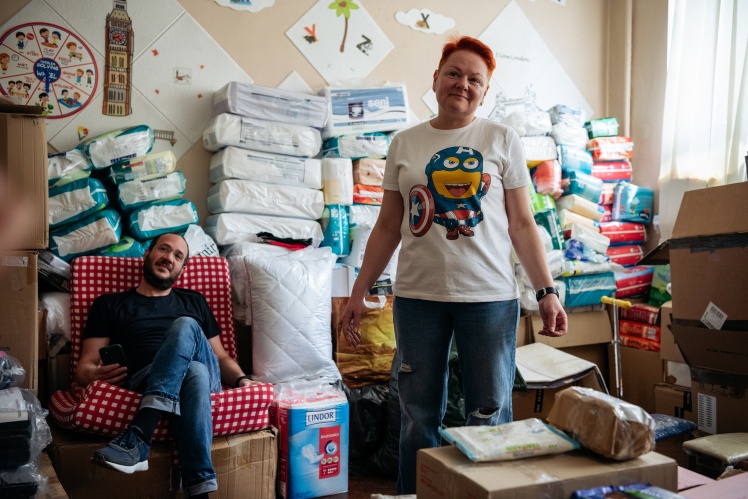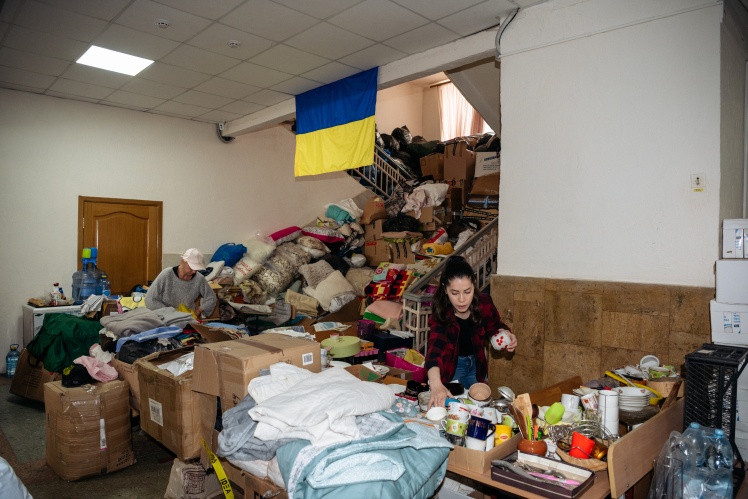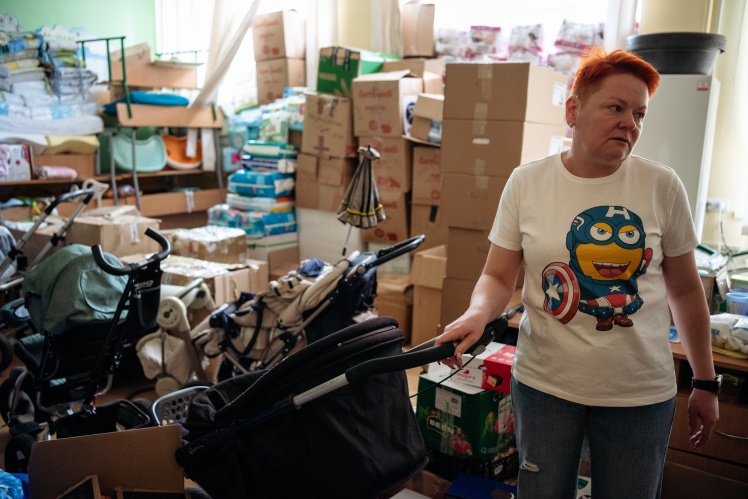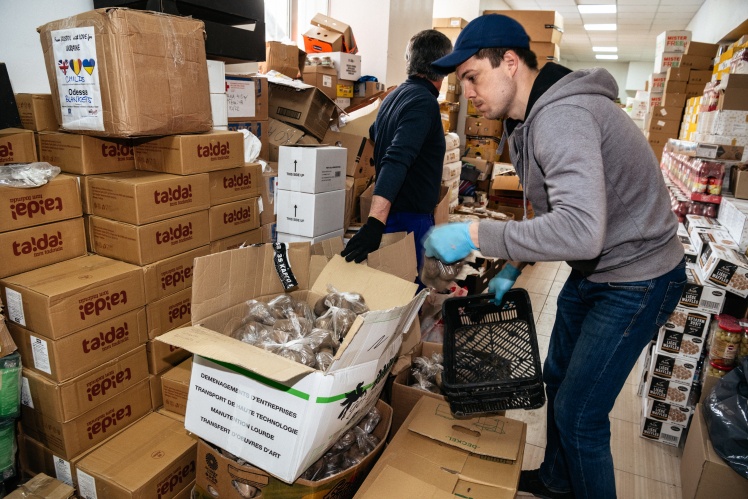A woman in a bathing suit is sunbathing on the hot concrete slabs of the Langeron, central Odesa beach. Itʼs prohibited to go down on sand, as all Odessa beaches are mined since the first days of full-scale invasion. Passages are covered with tapes, there are "Mines" signs. If you walk further from the center, in the direction of Arcadia beach and Dog Beach, there are places where single passers-by walk right next to the water, but in the city center there are fewer of them — the beach is patrolled by the Territorial Defense units. Moreover, in Shevchenko Park, through which the road to Langeron lies, itʼs even forbidden to approach the fences, from where you can see the seaport. Two men in military uniform are closely watching this.
Igor Hora / «Babel'»
With the photographer Ihor we approach kiosk with coffee, beer and chocolate bars and order two Americano servings. A 60-year-old woman starts a coffee machine and willingly picks up a conversation. She complains that there are not enough people, so she can barely make ends meet, this kiosk is her family business. The conversation quickly turns to the Russians — a woman swears at them for what their missiles are doing to the city.
— I donʼt understand how it is possible to kill children. Children! What kind of a bitch you have to be to fight with children! — she says emotionally.
On April 24, a Russian missile hit a residential building in Odesa, killing Valeria Glodan, her mother and three-month-old daughter Kira. And on May 2, a "sacred" day for Russian propaganda, a 15-year-old boy was killed in a bombing raid. For the people of Odesa, all these events were a serious blow.
— Where do you come from that you speak Ukrainian? — the saleswoman asks us.
We answer that I came from Kyiv, and Ihor is a local. The woman nods and continues.
— I understand very well what you are saying, but if I start speaking Ukrainian myself, you will laugh. We once came to Lviv for the Euro [football championship in 2012]. Oh, how they looked at us there, that we spoke Russian! In some places they didnʼt even want to serve us. It was unpleasant.
Ihor and I assure her that such cases are long gone. The woman says: "Thanks God!", instructs to take care of ourselves and exclaims: "Glory to Ukraine!". It seems that if we were not separated by a counter, she would even hug us.
Water for Mykolayiv
At seven in the morning, we have a meeting on the outskirts of the city, in one of the small city breweries. It is at this time that a truck with a water tank leaves for Mykolayiv, where there has been no water supply for the third week due to Russian shelling. Iʼm late — the taxi driver, as is often done in Odessa, brought me to the wrong address and wants more money. When we finally arrive, it turns out that Iʼm not the only one who is late — the driver who has to go to Mykolayiv doesnʼt pick up the phone.
We get acquainted with volunteers who organized a constant supply of water to the neighboring oblast center. Kostya and Olya are friends. He is short, bald and constantly smiling. Olya is two heads taller than him. Before the war they worked in one company.
Igor Hora / «Babel'»
— On February 24, I woke up to a husband running around the apartment in a panic, — Olya recalls the first day of the invasion. — I opened the messenger, and there are millions of messages. All are about the fact that the war began.
— Did you expect a war?
— No way. Well, the preconditions were, of course… But I remember how the day before [the invasion] I quarreled with my mother: she became very nervous, said that we have to leave [Odesa]. I replied ti her: "Mom, calm down, stop watching TV and everything will be fine." But no, on [February] 24 it all started.
— Why didnʼt you leave? — I ask.
— Iʼm not going anywhere, — Olya and Kostya say in one voice, then the girl continues. — I wonʼt say that I will never leave. I donʼt know what will happen next and what will happen to my psyche. But I decided for myself that I will be here until the end.
Olya and Kostyaʼs friend joined the Armed Forces of Ukraine on the first day of full-scale invasion. They began to help his unit, looking for some basic things — insoles for shoes, scotch tape, mats. Gradually the tasks became more complicated: they were already looking for bulletproof vests, thermal imagers, mufflers. The unit was transferred to "zero line" — near Mykolayiv. Arriving there, Kostya and Olya found out that there was no more water there.
At first they carried bottles, but quickly realized that it was nonsense — you canʼt bring much water this way. So they made something like a canister — a big soft bag into which water is poured, then it is loaded into a truck, and pipes are attached to it on the spot. This is way more convenient, Kostya explains: firstly, much more water can be delivered (now they bring about 24 — 25 cubic meters per day), and secondly, volunteers are sure that the water reaches the recipients. This amount of water is enough for the residents of the whole district. However, this is still not enough — because water is needed for both cooking and washing.
Igor Hora / «Babel'»
— You visit Mykolayiv regularly. How is it there now? — I ask.
— Like in Odesa, only more military equipment, — Kostya smiles. — Do you know what the difference is? In Odesa, when the siren sounds, everyone goes out to see where it flies. There is no such thing.
— In Mykolayiv there is Korabelny district, itʼs on the outskirts already, — Olya adds. — You go from one area to another — thereʼs life everywhere. And then everything changes in an instant — everything is gloomy, there are no people, the windows are covered with plywood.
The driver hasnʼt come yet. Volunteers already start to worry a little — that later the truck will reach Mykolayiv, the later it will return. This means that the schedule will be broken the next day. Kostya decides to go to Mykolayiv alone. He opens the truck door with a screwdriver and gets behind the wheel — but it turns out that the car does not have a license plate, so he canʼt go.
— In Korabelny people sat without water for a long time, — he returns to conversation. — They were very happy when we arrived.
— Do you have a limit on water per one person?
— When we distributed water bottles, there were limitations: only two bottles per person, — says Olya. — Then there were different comments. A woman approached us and said: "I have two children at home, please give me more water." And how can you refuse her?
— On the first day, everyone surrounded me, and the woman said, “Give the water to the child”, — Kostya recalls. — And before I gave her the bottle, a man pulls it out: “First to me, then to the child”. I was just shocked.
— People are taking their own containers now, — Olya continues. — They come with jars, canisters, barrels, cans — whatever they have at home.
The driver finally arrives — a tall man with a sleepy face. He refuses to tell why he was late — he says that the phone was discharged, so he did not hear the calls. Then he turns to Kostya, dissatisfied: he saw that the car door was broken. The men quickly close the truck, and it leaves the yard. It will return closer to eight oʼclock in the evening. Then it will be filled with water again, and the next morning the route will be repeated. Volunteers say they will carry water as long as there is a need for it.
Igor Hora / «Babel'»
— How do you feel about the mood in Odessa? — I ask when we are going to say goodbye.
— Odesa didnʼt yet feel what Mykolayiv feels now, — Kostya replies.
— And the mentality of Odesa does not allow to lose our nerves, — adds Olya. — It seems to me that even if there was nothing left here, people would still find the strength to smile and joke.
— What about pro-Russian sentiments? — I ask cautiously.
— I donʼt feel them, — Olya shakes her head. — You know, it looks like even those who have always been very “vatnik” are now the greatest patriots. They all hate Russia. It seems that their eyes have finally opened.
Deputies-volunteers
One of the main humanitarian aid centers in Odesa, founded by local businessman Mykola Viknyansky, is located in a school building on Richelyevska Street in the city center. Previously, this hub was in the Food Market, a popular city food spot — but now the business in Odesa is returning to normal, so the humanitarian center was moved to another location. At the door, there is a queue of several dozen people. They came for humanitarian aid, explains staff volunteer Petro Obukhov.
In 2020, Obukhov ran for mayor, taking third place with almost 12% of the vote. Now he is a deputy of the Odesa city council from the European Solidarity party. He arrives to the center on a monocycle. Even before the war, he was actively involved in urban planning in Odesa, advocating for a barrier-free environment, bicycle paths and trams. Obukhov has been a volunteer since the beginning of the war.
Igor Hora / «Babel'»
— At six in the morning [on February 24] I was awakened by Oleg Kostyantynov, — he recalls the beginning of the war. — He said: "This is it, the war has begun."
— Were you waiting for the war?
— I did not believe [it may start]. It still doesnʼt fit in my head, itʼs completely illogical, unprofitable [for Russia], just wrong. The first two days were shocking. I sat and read the news all the time, slept very badly. I had two opposite desires. The first is to stay at home and not go anywhere, and the second is to enroll in the Territorial Defense. But I chose something in the middle — I help here.
We walk through the classrooms, each of which now serves as a warehouse. In one of them the volunteers collect aid for the military, in the next one they sort medicines, in another is a warehouse of prams. Aid is divided into two groups: what citizens bring themselves, and a humanitarian cargo from abroad. It is also followed by two groups of people: internally displaced persons and low-income residents of Odesa (the latter are often retirees). There are piles of clothes and shoes in the courtyard.
— I will explain to you now what is happening here, and then people will look at your photos and think something is wrong, — a woman with short red hair approaches us. — People bring us a lot of clothes, but we canʼt give it right away. We need to look at it, sort it out, because, sorry, sometimes they bring something thatʼs a shame to give. What you see here is already sorted clothes, which we will not distribute because itʼs in poor condition. But we will give it to other volunteers who will make nets out of it.
The womanʼs name is Natalia Bogachenko, sheʼs a member of Obukhovʼs party and a well-known volunteer in the city.
Igor Hora / «Babel'»
— Yulia just asked me what local deputies do, — Obukhov says.
— We do everything that is necessary, — Bogachenko answers. — In this regard, we are no different from other volunteers. Although I am already approached by people with some household problems, and I write inquiries to the authorities. We use some of our power, especially in matters of cooperation with the government. There are many issues related to the Department of Health. Because we know them, and they know us, itʼs much easier for us to call and say: “We need 10 insulin testers and 10 blood pressure monitors”.
— Do you see a woman standing? — Obukhov points to a woman at the door, who is talking on the phone. — This is Lilia Leonidova, a deputy from the [pro-Russian party] OPZZH. She also volunteers with us here.
In 2020, the OPZZH, which full name translates as Opposition Platform — For Life, took second place in the local elections, losing to Odesa mayorʼs party Trust the deeds by a few percent — Mykola Skoryk lost to Hennadiy Trukhanov by only 20 thousand votes. Given the partyʼs openly pro-Russian sentiment in those elections, Iʼm surprised that someone from the OPZZH came to volunteer.
— For many deputies participation in OPZZH was simply an opportunity to receive a mandate in the City Council, — Obukhov explains. — So not everyone who joined [this party] was so ideological and pro-Russian.
— Now the most active Banderovites are, roughly speaking, former vatniks, — Bogachenko adds. — Do you know this feeling when you were betrayed? They hate the person who betrayed them the most. If our anger [against the Russians] is smoldering, in their case, there is fire inside. Itʼs very difficult for them now. That is why they are ready to work endlessly in warehouses, to do something to find excuses for themselves. After all, for so many years they thought that [Russia and the Russians] were friends to us.
Igor Hora / «Babel'»
I ask about Hennadiy Trukhanov. Prior to the war, he was often accused of being pro-Russian and having close ties to Russia.
— Trukhanov, by the way, wanted to come here to us. Viknyansky told him: "You help us first, and then come," says Obukhov. — But it is worth paying tribute to him [Trukhanov] — he now fully contributes to the work of Viknyansky.
— Do you think he really was in the waiting position in the first days of the invasion? That he just looked which side will have the advantage?
— I think he waited, but not because he wanted the arrival of Russia, — says Obukhov. — Most of his voters are pro-Russian. My hypothesis is that he did not want to lose them.
Territorial Defense
Oleksandr Slavskyi is the head of the regional branch of the State Property Fund in Odesa and Mykolaiv oblasts. Since February 25, he has been serving in the Odesa Territorial Defense {TD}.
— We have been working with the Territorial Defense, it seems, since December, — he says, while we are standing near one of the TS barracks. — They were looking for premises in Odesa, as well as in Odesa and Mykolayiv oblasts. In the evening of February 23, we held a meeting of the Territorial Defense leadership with the business community. At that meeting, they were still discussing whether it would be appropriate to drink champagne on this occasion.
On the morning of February 24, Slavskyi, like most residents of Odesa, woke up due to the sound of explosions. He went to work, completed all the protocol actions for the evacuation of secret documents. The next day came to the location of TD.
— I said: "Enlist me", and they answered: "Well, why, Sasha?" — Slavsky laughs. — I said, “Okay, then just give me the weapon, Iʼll get the uniform myself”. They agreed, listed me as their staff. And there were already too many people. The boys and girls [who registered the volunteers] sat with big eyes and said, “Are you a doctor? No? There are no vacancies".
Pretty soon Slavskyi, who came to TD as a private, began to engage in logistics — his peacetime skills came in handy. Now, he says, tens of thousands of troops are deployed in Odesa and Odesa oblast. Two brigades were recruited on the basis of TD. He claims that there is no shortage of people willing to defend the region. Therefore, there is no need for ordinary civilians in the TD, but there is always a need for doctors and those who have a military specialty, such as radio operators.
— I honestly didnʼt expect that the Territorial Defense would be an effective combat unit, — admits Slavsky. — Because, well, for example, Iʼm not very much of a soldier. But it turned out that the Territorial Defense is a very good unit.
— You say that you arenʼt a soldier, but for some reason you joined [the TD], — I reply
— At first, I didnʼt understand much at all. I thought: as soon as they gave me a machine gun, I would shoot somewhere. No matter care where, not a word about efficiency — the main objective was to just survive.
The chairman of the Democratic Alliance party in Odesa, Yuriy Dyachenko, also joined the Territorial Defense forces on the first day of all-out war.
— On February 21, I listened to Putin, probably for the first time in my life, — recalls Yuriy. — Then it became clear that there will be a big war and that it has actually already begun. On February 24, I came to the military registration and enlistment office, although I have no military experience — I have a “white ticket”. I was confirmed my diagnosis and sent to the Territorial Defense [which accepts people with the “white tickets”].
Both Slavskyi and Dyachenko say that in fact the Territorial Defense is just an ordinary unit of the Armed Forces of Ukraine. But their priority is to defend the territories where they were called. That is, in the case of Odesa, it is mainly about the defense of Odesa oblast and southern Ukraine. Dyachenko, of course, doesnʼt tell what exactly his division was engaged in, but speaks that guys were sent “to zero point” in Mykolayiv and even in the Kharkiv oblast. Slavskyi adds that the TD units are also setting up checkpoints in the city and patrolling the streets. I ask him if there are any problems with supplies.
Igor Hora / «Babel'»
— Everything is much better than in the first days, — says Slavskyi. — We switched to military food, the city also feeds us. Just so you know, I ate dumplings and crab salad yesterday. There are not enough combat accessories when units are brought to the frontline. There is a lack of individual first-aid kits by NATO standards. But if in the first days everything was in shortage, now the fighters can choose between different options.
— Do you think Putin will be able to take Odesa?
— I came here on February 25 confused, with uncertainty and misunderstanding of what is happening. It seemed to me that the military was creating some kind of chaos. Now I have a little understanding of this and understand that this is not chaos. The military, while they smoke here, may look like big and relaxed dudes, but if necessary, they can, have the knowledge and means to protect themselves. There is an understanding that these boys and girls standing around me will protect me while I talk to you.
Odesa is Ukraine
In the evening of May 3 in Odesa, despite the air alarm, people are walking slowly through the streets, sitting on benches. TD personnel stand at checkpoints, which are much larger than in Kyiv, watching passers-by. Sometimes they stop those who take pictures, but after a short conversation they let them go. Yura Dyachenko was released from the unit for a short time, he must return there before the curfew. We are talking about what is happening in Odesa.
— Iʼm one of them, — he points in the direction of the city council building. They [city deputies] for some reason decided that the war is a reason to become secretive again. Although there is no fighting in Odessa itself, life goes on. But I have accustomed the city council to publicity, so we will return.
«Babel'»
Before the war, Dyachenko was one of the most famous activists in Odesa, advocating for transparent work of city deputies, against illegal construction and privatization of beaches. He was beaten and detained more than once. Given his serious pro-Ukrainian background, it is not surprising that Yuriy joined the TD on the first day of the full-scale invasion.
— There were a lot of people in the military registration and enlistment office when you came? — I ask him.
— A lot, — he says. — There were really queues. I will say more, it was not so easy to get there. I know that some who immediately went to the TD were not taken there.
— Did you expect there will be so many people?
— Well, I was pleased and probably, yes, I expected. Because we have done a lot over the years to prove that Odesa is Ukraine.
A family passes us — a woman with a husband and a son aged 4-5. The boy stops, approaches Yuriy, who is sitting in a military uniform, gives him a fist and says: "Glory to Ukraine."
— Today I hear from different people that now the greatest patriots in Odesa are former pro-Russian activists. Do you agree with that?
— Nobody gathered any statistics. We worked a lot in the region and detained not just pro-Russian activists, but real collaborators who worked directly with the enemy, — he answers. — It seems to me that if the people here were more active [in political terms] and more politically conscious, then everything would have developed differently. But people understand that Ukraine is Europe, in the future for sure, and that Ukraine is definitely better than Russia.
Igor Hora / «Babel'»
Translated from Ukrainian by Anton Semyzhenko.
Support Babel:🔸donate in hryvnia 🔸in cryptocurrency 🔸via PayPal: [email protected].
